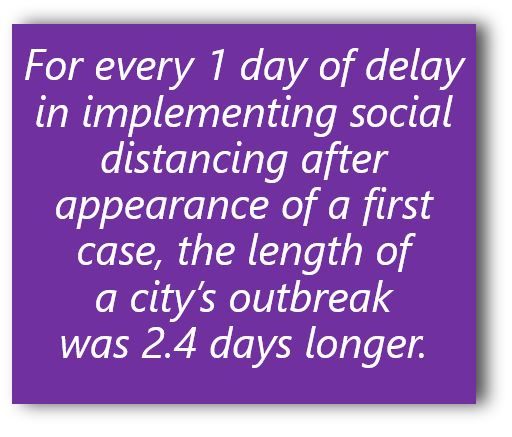
- Clinical Technology
- Adult Immunization
- Hepatology
- Pediatric Immunization
- Screening
- Psychiatry
- Allergy
- Women's Health
- Cardiology
- Pediatrics
- Dermatology
- Endocrinology
- Pain Management
- Gastroenterology
- Infectious Disease
- Obesity Medicine
- Rheumatology
- Nephrology
- Neurology
- Pulmonology
Early Social Distancing Reduced Length of Virus Outbreak, Study Finds
Study authors project that, if COVID-19 returns, a 1-week delay in social distancing could require up to 17 more days to once again slow the spread.
Cities that took longer to initiate social distancing measures in response to the COVID_29 outbreak saw longer periods of rapid virus spread than those that acted more quickly. The findings are based on an analysis of COIVID-19 outbreaks in 58 cities conducted by epidemiological researchers at The University of Texas at Austin.
According to a news release from the University of Texas, publication of the new paper is pending in the CDC’s journal Emerging Infectious Diseases.
Analyzing cities throughout China, the researchers looked at when first cases were detected, when social distancing measures began, and when the outbreak was considered contained. For every 1 day of delay in implementing the measures after appearance of a first case, the length of a city’s outbreak was 2.4 days longer, according to the press release.
“Every day saves time, saves effort, saves people becoming infected and probably saves lives,” said Lauren Ancel Meyers, a professor of integrative biology who leads the UT Austin COVID-19 Modeling Consortium. “This is particularly important as we think about the coming weeks and months.”

Meyers said the team’s findings can be applied to a city experiencing a first outbreak as well as to cities that may experience a resurgence of the virus as shelter-in-place and other containment measures are relaxed. According to the data, a single week of delay after early signs of resurgence could require up to 17 more days of social distancing to slow the spread again.
Considering reinstituting the unprecedented interventions first levied in March 2020 is going to be difficult, according to Spencer Fox, associate director of the UT Austin COVID-19 Modeling Consortium and co-author on the paper. But early action, he said in the release, “will mean fewer days of social distancing orders.”
“Our findings have implications for the timing of interventions in U.S. cities,” Meyers said.
“The impact of delays may be particularly important for communities that are prone to rapid transmission, such as nursing homes, colleges, schools and jails. We need concrete plans for when and how to respond to rising cases to prevent unnecessarily long and costly restrictions.”
After looking at case counts in a specific area, an outbreak is considered “contained” when the reproduction number—a measure of how many people will be infected by one infectious person—drops below 1.
Methodology of the UT study differs from other studies on the impact of delayed social distancing measure, which have used modeling to estimate a link between the time of measures being taken and the effect on outbreaks. This study used on-the-ground data to determine the link between cities taking measures to contain the virus and rates of the virus spreading.
Which social distancing measures are more effective than others could not be determined from the data but, the announcement underscores, the study did show that the timing of that first measure, regardless of the type, had a big impact.
While the UT study analyzed cities during the earliest days of an outbreak, the findings are also relevant for cities in the middle of an outbreak, according to Meyers.
“We provide direct, data-driven evidence that the timing of interventions has a substantial impact on how long an outbreak lasts, how effective our interventions are and, ultimately, how many people might be infected and die from the virus,” Meyers said.
_________________________________________________________________________________
For more COVID-19 coverage for primary care, visit our COVID-19 Resource Page.
No Rx Required for COVID-19 Vaccination But ACIP Calls for Better Informed Consent Process
September 22nd 2025The ACIP on September 19 narrowly voted against requiring a prescription to get the shot but urged more detailed discussion of vaccine risks during shared decision making conversations.
No Rx Required for COVID-19 Vaccination But ACIP Calls for Better Informed Consent Process
September 22nd 2025The ACIP on September 19 narrowly voted against requiring a prescription to get the shot but urged more detailed discussion of vaccine risks during shared decision making conversations.
2 Commerce Drive
Cranbury, NJ 08512
All rights reserved.